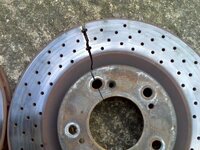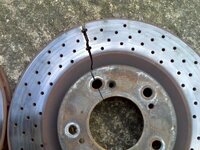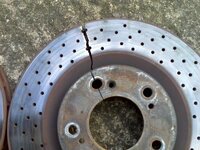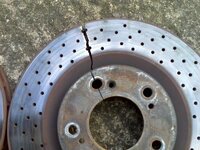Lower said:
I doubt you'll get much joy from AP unless its as a goodwill gesture. I doubt they're faulty, just used harder and longer than designed for.
IMO I did not use them harder or longer then designed for. They are designed for trackdays and for the use I give them. This set of discs had hardly any track time in comparison with the previous set. Personally I think I had bad luck with one disc and there was a weak spot in the metal. This can happen and that's why I had a crack like this. Ok, the discs is useless and not safe to use on trackdays again, but it was only a crack..the disc did not explode and was not separated in two. When driving home I did feel something was wrong and when I checked the brakes it was clear what was going on.
Lower said:
I would start looking for a pad with a higher coefficient of friction and a higher initial bite. Brings the disc temperature down considerably.
I use Pagig RS-14; this is a pad that already has a real high initial bite (higher then the commonly used RS-29). RS-14 offer very low heat conductivity which allows less thermal transfer from disc through pad, thus resulting in lower caliper and brake fluid temperatures which can have a critical effect on ultimate brake performance.
Friction Level RS-14
Cold 0.44
At 100°C 0.47
At 300°C 0.49
Max at (@ 600°C) 0.54
Constant working temperature 400 – 700°C
Max temperature for short period only: 800°C
Friction Level RS-29
Cold 0.40
At 100°C 0.43
At 300°C 0.47
Max at (@ 550°C) 0.49
Constant working temperature: 400 – 700°C
Max temperature for short period only: 750°C
Lower said:
For reference i've attached a pic of a Spoon disc used on track with Ferodo DS2500 pads on my first S2000.
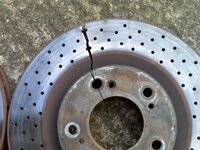
The DS2500 pads performed very well but overheated the disc. I then tried the DS2500 pads and Dixcel Type Z pads on a disc using heat paint to indicate the peak temperature reached. With the DS2500 pads the discs were exceeding 625 degrees C. With the Dixcel type Z pads the discs were under 530 degrees C.
Different pads seem to perform differently with different cars though.
Ferodo DS2500 is a fast road pad, NOT a intensive track day pad. When using DS2500 intensively on trackdays then it's asking for trouble (I have heard this many times from other people)… Great for fast road driving..not so great on track!
